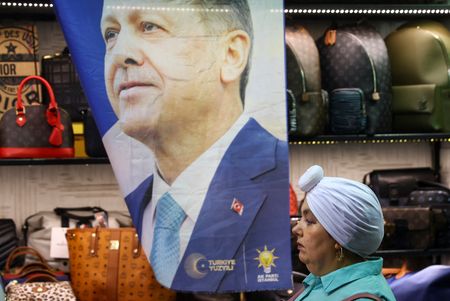 1
1 1
1
By Issam Abdallah and Burcu Karakas
ANKARA/ISTANBUL (Reuters) – President Tayyip Erdogan’s election victory showed the magnetic hold he still has over millions of Turks after 20 years in power, with many believing he is the man best placed to fix problems which critics say are partly of his own making.
Hundreds of thousands of flag-waving supporters celebrated into the night, illustrating the enthusiasm that Erdogan and his Islamist-inspired politics generate among his fans, despite economic hardships which many thought would prompt his defeat.
“The victory is ours, how happy it is for us. Bye-bye, Mr. Kemal. Thank God, Islam has won,” said an Erdogan supporter who gave his name as Banu, referring to the opposition’s Kemal Kilicdaroglu who was defeated on Sunday.
“Today is our happy day. Our President has won. I feel like I’m going on a pilgrimage to Mecca,” added another, Omer, among the thousands of people gathered at the presidential palace in Ankara.
The result renewed the mandate of a leader who has brought far-reaching changes to Turkey, shaping a traditionally secular state according to his pious vision while amassing ever more power in his hands and asserting influence on the global stage.
A veteran of a dozen electoral wins and a skilled orator, Erdogan prevailed after deploying both conservative and nationalist rhetoric in withering attacks on Kilicdaroglu.
Appealing to his conservative Muslim voter base, he repeatedly described the opposition as being pro-LGBT during his election rallies.
He also alleged that Kilicdaroglu had ties to the militant Kurdistan Workers’ Party (PKK), which is viewed with hostility by many Turks because of a deadly insurgency it has been waging since 1984. Kilicdaroglu called the claim slanderous.
But for Erdogan, the sloganeering helped deflect attention from economic troubles, including a cost-of-living crisis which critics have largely blamed on his unorthodox economic policies of cutting interest rates in the face of soaring inflation.
He was aided by a largely friendly Turkish media landscape which critics say Erdogan has bent to his will.
Erdogan won with 52.1% support compared to 47.9% for Kilicdaroglu, pointing to a deeply divided nation.
‘HE BUILT ROADS’
While acknowledging tough times, some of Erdogan’s supporters said he was the man to improve the situation.
“We love him a lot … The country has many problems but if anyone can solve them, he can,” said Nuran after casting her vote in Istanbul.
Others voted based on a longer-term assessment of his rule, citing the growth of Turkey’s economic and diplomatic power since he came to power in 2003.
“I voted for Erdogan because he is a world leader. I voted for him because I appreciate the things he has done for Turkey. He changed the health system for good. He built roads,” said construction worker Omer Kosekol, 58, in Istanbul.
Erdogan’s performance defied expectations that he would pay a political price in the wake of deadly earthquakes that killed more than 50,000 people in the southeast in February. Critics accused his government of a slow response and lax enforcement of building rules, failures they said could have cost lives.
But his AK Party came out top in 10 of the 11 provinces hit by the earthquake, helping it to secure a parliamentary majority along with its allies in a legislative election held alongside the presidential vote this month.
Ravza Kavakci, a former AK Party lawmaker, said voters had picked a leader “they trust on the economy, and who they trust to build homes for those affected by the earthquakes, and someone they always trusted for the security of the country.”
Emre Erdogan, a political science professor at Istanbul Bilgi University, said he had successfully presented himself as a national saviour against threats while maintaining the support of conservative voters who were long marginalised.
His success is “supported by the belief of Erdogan’s electorate in his ability to solve problems, even though he created many of them”.
(Additional reporting by Jonathan Spicer and Can Sezer; Editing by William Maclean; Writing by Tom Perry; Editing by Daren Butler, William Maclean)